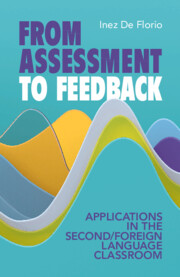Book contents
- From Assessment to Feedback
- From Assessment to Feedback
- Copyright page
- Contents
- TEFL Examples
- Introduction
- Part I Basic Concepts of Assessment and Feedback in the Foreign-Language Classroom
- Part II Assessment and Feedback in Its Different Manifestations
- 5 How to Implement Successful Feedback in Foreign-Language Teaching
- 6 Involving the Learners in Important Decisions
- 7 Feedback Is No One-Way Street
- 8 Peer Feedback Needs to Be Learned
- 9 Self-Assessment
- 10 Collegial Feedback Strengthens Language Teaching and Learning
- 11 What about Electronic Assessment and Feedback?
- 12 Remote and Hybrid Learning
- Part III Summative Assessment in Combination with Formative Feedback
- Glossary
- References
10 - Collegial Feedback Strengthens Language Teaching and Learning
from Part II - Assessment and Feedback in Its Different Manifestations
Published online by Cambridge University Press: 19 January 2023
- From Assessment to Feedback
- From Assessment to Feedback
- Copyright page
- Contents
- TEFL Examples
- Introduction
- Part I Basic Concepts of Assessment and Feedback in the Foreign-Language Classroom
- Part II Assessment and Feedback in Its Different Manifestations
- 5 How to Implement Successful Feedback in Foreign-Language Teaching
- 6 Involving the Learners in Important Decisions
- 7 Feedback Is No One-Way Street
- 8 Peer Feedback Needs to Be Learned
- 9 Self-Assessment
- 10 Collegial Feedback Strengthens Language Teaching and Learning
- 11 What about Electronic Assessment and Feedback?
- 12 Remote and Hybrid Learning
- Part III Summative Assessment in Combination with Formative Feedback
- Glossary
- References
Summary
If feedback among colleagues should contribute to better teaching and learning, there have to be reciprocal agreements about what aspects should be observed and evaluated and in what way. Whereas well-known scientists left out collegial feedback, Andreas Helmke, a German educationalist, dedicates part of his academic career to this subject. He furnishes a great variety of observation sheets and evaluation programs, also in English, that can be adapted for collegial feedback in the foreign-language classroom. In order to come closer to face-to face feedback discussions among colleagues, valuable suggestions of researchers and practitioners should be taken into account.
- Type
- Chapter
- Information
- From Assessment to FeedbackApplications in the Second/Foreign Language Classroom, pp. 159 - 174Publisher: Cambridge University PressPrint publication year: 2023

